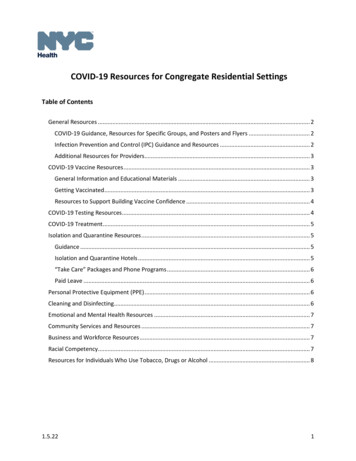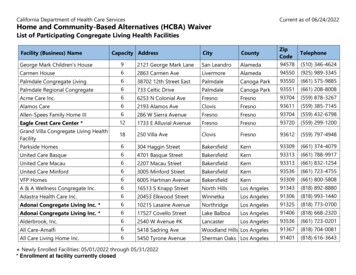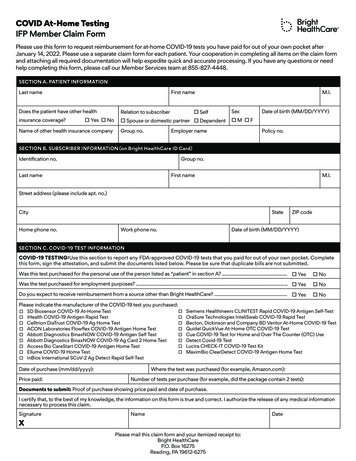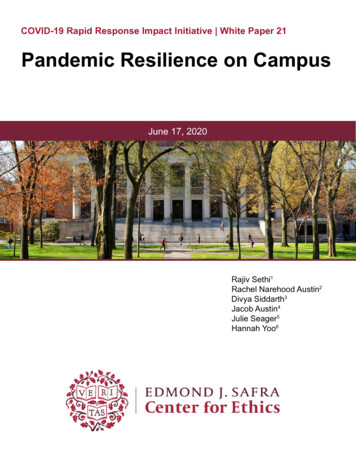
Transcription
COVID-19 Resources for Congregate Residential SettingsTable of ContentsGeneral Resources . 2COVID-19 Guidance, Resources for Specific Groups, and Posters and Flyers . 2Infection Prevention and Control (IPC) Guidance and Resources . 2Additional Resources for Providers. 3COVID-19 Vaccine Resources . 3General Information and Educational Materials . 3Getting Vaccinated. 3Resources to Support Building Vaccine Confidence . 4COVID-19 Testing Resources . 4COVID-19 Treatment. 5Isolation and Quarantine Resources . 5Guidance . 5Isolation and Quarantine Hotels . 5“Take Care” Packages and Phone Programs . 6Paid Leave . 6Personal Protective Equipment (PPE) . 6Cleaning and Disinfecting. 6Emotional and Mental Health Resources . 7Community Services and Resources . 7Business and Workforce Resources . 7Racial Competency. 7Resources for Individuals Who Use Tobacco, Drugs or Alcohol . 81.5.221
This Resource Toolkit from the New York City Department of Health and Mental Hygiene (NYCHealth Department) is a compilation of resources available to residents and staff in congregateresidential settings to support continued COVID-19 prevention and response. Please contactcsiru@health.nyc.gov with any questions.General ResourcesCOVID-19 Guidance, Resources for Specific Groups, and Posters and Flyers General COVID-19 information, guidance and resources are available atnyc.gov/health/coronavirus. COVID-19 Guidance and Resources for Congregate Residential Settings: This documentprovides guidance for administrators and staff of congregate residential settings tosupport continued COVID-19 prevention and response activities. For resources to support specific groups of people, visit nyc.gov/health/covidproviders,select the Facilities Guidance tab and expand the “Congregate and Residential Facilities”drop-down to see the following:o Supporting Adherence to COVID-19 Prevention and the Emotional Well-Beingof Children and Adolescents in Congregate Residential Settingso Supporting Adherence to COVID-19 Prevention for Individuals Living withAlzheimer’s and Dementiao Supporting Adherence to COVID-19 Prevention for Individuals Living withIntellectual and Developmental Disabilities For posters and flyers in multiple languages, visit nyc.gov/health/coronavirus and selectPosters and Flyers on the left sidebar. For NYC Health Department educational videos, visit youtube.com/nychealth:o Face masks: Languages include English, Spanish, Mandarin, Cantonese, Urdu,Russian, Polish, Traditional Chinese, Simplified Chinese, French, Italian, Korean,Bengali, Arabic, Spanish, Hindi, Japanese, Punjabi and Vietnamese.o Physical distancing: Languages include English, Spanish, Mandarin, Cantonese,Hindi, Japanese, Korean, Punjabi, Russian and Vietnamese.o Handwashing: Languages include English, Spanish, Mandarin, Cantonese,Japanese, Russian, Punjabi, Hindi, Korean and Vietnamese. For New York State (NYS) COVID-19 guidance, visit coronavirus.health.ny.gov. For guidance from the Centers for Disease Control and Prevention (CDC), visitcdc.gov/covid19.o For infection control guidance by facility type, visit cdc.gov/covid19, select theHealthcare Workers tab, and select Infection Control Topics.o For print resources such as posters, flyers and fact sheets, visit cdc.gov/covid19and search for Print Resources.Infection Prevention and Control (IPC) Guidance and Resources For resources on preventing COVID-19 transmission in congregate residential settings,visit nyc.gov/health/covidproviders, select the Facilities Guidance tab and expand the“Congregate and Residential Facilities” drop-down to see the following:2
o COVID-19 Infection Prevention Checklist for Congregate Residential Facilitieso COVID-19 Infection Prevention Competency ToolsThe NYC Health Department offers IPC trainings for staff and residents at congregateresidential settings. To schedule a training for your facility staff or residents, contactipc@health.nyc.gov.For a webinar on IPC in adult housing and care facilities, visit youtube.com/nychealthand search for Competency Training and Best Practices for Preventing COVID-19Spread in Adult Housing and Care Facilities.For additional trainings on IPC developed by the CDC, visit train.org/cdctrain and searchIPC for COVID-19 and Nursing Home Infection Preventionist Training Course.To learn about different infection control topics, visitcdc.gov/infectioncontrol/projectfirstline and select Learn About Infection Control.Additional Resources for Providers General information, guidance documents, health alerts, webinars and other resourcesfor providers are available at nyc.gov/health/covidproviders. Provider Access Line: Providers can call 866-692-3641 for immediate consultation onpublic health matters, including COVID-19. Health Alert Network (HAN): Register for email alerts and advisories on public healthtopics including COVID-19, vaccines and other health issues. Visit nyc.gov/health andsearch for HAN.COVID-19 Vaccine ResourcesGeneral Information and Educational Materials General information, guidance and resources on COVID-19 vaccines are available atnyc.gov/covidvaccine. For NYS guidance and resources, visit covid19vaccine.health.ny.gov. For information and resources from the CDC, visit cdc.gov/coronavirus/vaccines.Getting Vaccinated For information on who can receive a vaccine, see on.nyc.gov/receive-vaccine. To find a vaccination site or to make an appointment, visit vaccinefinder.nyc.gov or call877-VAX-4NYC (877-829-4692). Many sites offer vaccination without an appointment. To schedule free in-home vaccination, visit nyc.gov/homevaccine or call 877-VAX4NYC. To learn more about on-site vaccination in congregate residential settings, contactcsiru@health.nyc.gov. For personal health questions related to vaccination, people should contact their healthcare provider or call 311 for assistance if they do not have a provider.3
Resources to Support Building Vaccine Confidence For fact sheets and resources to help in having conversations with people about thevaccines, visit nyc.gov/covidvaccine and look under “Additional Resources” and clinic onthe “Download/Read” dropdown. For resources on building vaccine confidence, visit nyc.gov/health/covidproviders,select the Vaccines tab and expand the “Speak to Patients and Build VaccineConfidence” drop-down. For NYC Health Department educational videos in multiple languages, visityoutube.com/nychealth and see COVID-19 Vaccines. For CDC guidance, visit cdc.gov and search for Talking with Patients About COVID-19Vaccination. NYC Health Department offers COVID-19 virtual vaccine education presentations forcongregate residential settings. Please complete the form atforms.office.com/g/GMFVTm1gpB to request a presentation. The Roll Up Your Sleeves Toolkit contains basic information about COVID-19 prevention,frequently asked questions and myths vs. facts about COVID-19 vaccines. The toolkit isavailable in English, Spanish and French Creole, at rollupyoursleevesny.org. The De Beaumont Foundation offers resources to help providers strengthen theirmessaging when answering vaccine-related questions, available atchangingthecovidconversation.org. A Kaiser Family Foundation campaign called “THE CONVERSATION: Between Us, AboutUs” created a video for Black health care professionals and researchers to have openconversations and provide information about COVID-19 vaccines. Visit youtube.com andsearch for Hello Black America! with W. Kamau Bell & Black Health Care Workers. Theycontinue the conversation by answering commonly asked questions regarding COVID-19at greaterthancovid.org/theconversation.COVID-19 Testing Resources For general information about COVID-19 testing, visit nyc.gov/health/coronavirus andselect Testing on the left sidebar. Testing sites in NYC:o Walk-in testing is available at no cost at NYC Health Hospitals locations. tes.o COVID Express sites offer free COVID-19 tests to all New Yorkers regardless ofimmigration status. An appointment is required and can be scheduled atnyc.gov/health/covidexpress.o Visit nyc.gov/covidtest to find a testing site near you. Note: Some sites maycharge for testing. Verify before you visit.o For more information about on-site COVID-19 testing in residential congregatesettings in NYC, email covidtestingcsiru@health.nyc.gov.4
COVID-19 TreatmentWhen given early after symptom onset, COVID-19 treatment can decrease the risk ofhospitalization and death due to COVID-19. There are two types of outpatient treatment:monoclonal antibodies (one time IV infusion or injection) and oral antiviral pills. For information about treatments for COVID-19, visit nyc.gov/health/coronavirus andselect Treatments on the left sidebar. For information on eligibility, evidence behind recommendations, treatmentprioritization guidance, and how to access and use therapeutic agents, visitnyc.gov/health/covidproviders and select the Outpatient Therapies tab. For an informational video on monoclonal antibody treatment, visityoutube.com/nychealth and search for COVID-19 Monoclonal Antibody Treatment,presented by Dr. Celia Quinn from the NYC Health Department. People should talk to their health care provider about whether they are eligible for andhow to get treatment.o NYC Health and Hospitals offers a monoclonal antibody eligibility screening toolat covid19.nychealthandhospitals.org/mab.o The Health Information Tool for Empowerment (HITE) is a free online directoryoffering information on health and social services. For a monoclonal antibodytreatment locator from HITE, visit hitesite.org/monoclonalantibody.o New Yorkers can also visit expresscare.nyc and click Talk to a Doctor Now, orcall 212-COVID19 (212-268-4319) to have a NYC Health Hospitals (H H) doctoranswer their questions about treatment.Isolation and Quarantine ResourcesGuidance For NYC Health Department guidance, visit nyc.gov/health/covidproviders and seeCOVID-19 Guidance for Isolation, Quarantine and Transmission-Based Precautions. For NYSDOH guidance, visit coronavirus.health.ny.gov, select the Guidance tab andrefine your search with the keywords Vulnerable Residents.Isolation and Quarantine Hotels New Yorkers who test positive for COVID-19 or who may have been exposed to the viruscan qualify for a free hotel room to safely separate and protect their loved ones duringthe isolation or quarantine period. Visit nychealthandhospitals.org/test-andtrace/take-care for more information on Health Hospitals Take Care Hotels.o To get a Take Care isolation and quarantine hotel room for a resident, staff atthe facility should complete one referral form and HIPAA form per person andsend it by email to expeditedref@nychhc.org. These forms can be obtained froma point-of-contact at the NYC Health Department or by emailingcsiru@health.nyc.gov.o NYC Department of Homeless Services (DHS) shelters should contact DHS’sSerious Incident Unit and NYC Human Resources Administration (HRA) sitesshould contact their assigned HRA representative to procure hotel rooms for5
their residents through the NYC Department of Social Services Isolation andQuarantine Hotel program.“Take Care” Packages and Phone Programs “Take Care” packages are available to New Yorkers who test positive for COVID-19 andto their contacts (individuals exposed to COVID-19). The package includes masks, handsanitizer, disposable thermometers, cleaning wipes, health education materials and apulse oximeter for individuals who test positive for COVID-19. Staff of congregate residential settings can request packages through a point-ofcontact at the NYC Health Department or by emailing csiru@health.nyc.gov.More information about Take Care packages can be found race/take-care-package/. Phones are available to all COVID-19 cases and known contacts who have a need for aphone or minutes during isolation or quarantine. The phone can be used tocommunicate with NYC Health Department staff and others, including personal contactssuch as family members, friends, and providers. Staff of congregate residential settings can request phones through a point-ofcontact at the NYC Health Department or by emailing csiru@health.nyc.gov.Paid Leave For a summary of paid sick leave requirements in NYS, orkers/COVID-19-Paid-SickLeave-English.pdf For information on Paid Leave for COVID-19, visit paidfamilyleave.ny.gov/covid19.Personal Protective Equipment (PPE) For general information about face masks, visit on.nyc.gov/face-masks. Congregate residential settings may be eligible to obtain NIOSH-approved N95 andother respirators and PPE through the PPE Service Center. Emailppesupport@health.nyc.gov with questions about eligibility and access. For resources on preventing COVID-19 transmission in congregate residential settings,visit nyc.gov/health/covidproviders, select the Facilities Guidance tab and expand the“Additional Resources” drop-down to see the following:o Personal Protective Equipment and Medical Supply Companieso Strategies for PPE Reuse and Extended Useo Use of N95 Respirators: Fit Testing and Respiratory Protection ProgramResources For a tool to plan and optimize the use of PPE in response to COVID-19, visit cdc.gov andsearch for PPE Burn Rate Calculator.Cleaning and Disinfecting For CDC guidance on cleaning and disinfecting your facility, visit cdc.gov/covid19 andsearch Cleaning and Disinfecting Your Facility.6
For guidance on disinfectant use, including a list of disinfectants that kill all strains andvariants of coronavirus from the Environmental Protection Agency (EPA), visitepa.gov/coronavirus and select Disinfectant Use and Coronavirus.Emotional and Mental Health Resources For NYC mental health resources and substance use services, visitmentalhealthforall.nyc.gov. For free, confidential and anonymous emotional support from trained crisis counselors,visit nyprojecthope.org or call the emotional support helpline at 844-863-9314. Crisiscounselors are available from 8 a.m. to 10 p.m., seven days a week. For free and confidential counseling for people who are experiencing grief, stress,depression, anxiety or drug use, call 888-NYC-WELL (888-692-9355), text “WELL” to65173, or chat online at nyc.gov/nycwell. Support is available in over 200 languages,24/7.o For free mental health support applications (apps), visit nyc.gov/nycwell andselect the App Library tab. For Health Department behavioral health resources for providers and staff, visitnyc.gov/health/covidproviders, select the Facilities Guidance tab and expand the“Congregate and Residential Facilities” drop-down to see Behavioral Health Resourcesfor Health Care Providers and Personnel During COVID-19. For a tip sheet on coping with stress and compassion fatigue as a provider, visitsamhsa.gov/dtac and select Tips for Healthcare Professionals: Coping with Stress andCompassion Fatigue.Community Services and Resources For an online resource directory that connects New Yorkers with free and low-costhealth and social services, visit hitesite.org. For support with food, health insurance, employment, housing and free COVID-19testing visit nyc.gov/coronavirus and select Resources for New Yorkers.Business and Workforce ResourcesResources are available to support businesses facing staffing shortages and to offer financialassistance in response to COVID-19. For hiring assistance, visit nyc.gov/nycbusiness and search for Hiring Assistance forBusinesses. For help requesting volunteer support, visit newyorkcares.org/community-partners andselect Request volunteer support. For additional resources, including financial assistance, visit nyc.gov/helpnownyc andsearch for Assistance for Organizations.Racial CompetencyRacial competency is critical in understanding and addressing health disparities caused byracism.7
For a Health Department toolkit to help individuals and organizations understand andaddress racial and social injustices that affect the health of all New Yorkers, visitnyc.gov/health and search for Race to Justice.To see the NYC Board of Health’s Resolution Declaring Racism a Public Health Crisis,visit nyc.gov/health and search for Board of Health.For a list of diversity and inclusion resources from the NYS Office of Mental Health, visitomh.ny.gov and search for Diversity and Inclusion Resources.To see the CDC’s webpage on racism and health, visit cdc.gov/healthequity and selectRacism and Health.Resources for Individuals Who Use Tobacco, Drugs or Alcohol For Health Department resources on alcohol and substance use related to COVID-19,visit nyc.gov/health/coronavirus and select Mental Health and Substance Use on theleft sidebar to see the following:o COVID-19 Guidance for People Who Use Drugso Drug Tolerance and Risk of Overdoseo How to Get Opioid Use Disorder Treatment at Home During the COVID-19Pandemico Telemedicine Is Available to Treat Opioid Use Disordero Smoking, Vaping and COVID-19o Alcohol Use During the COVID-19 Pandemic Additional guidance for people who use alcohol or drugs can be found by visitingnyc.gov/health and searching for Alcohol and Drug Use.*Disclaimer: This list is neither exclusive nor exhaustive. The NYC Health Department isproviding this information to assist New Yorkers locate services and for general information butdoes not make any representation or warranty concerning the quality or accuracy of theservices provided by third parties.The NYC Health Department may change recommendations as the situation evolves.1.5.228
COVID-19 Treatment . When given early after symptom onset, COVID-19 treatment can decrease the risk of hospitalization and death due to COVID-19. There are two types of outpatient treatment: monoclonal antibodies (one time IV infusion or injection) and oral antiviral pills. For information about treatments for COVID-19, visit










